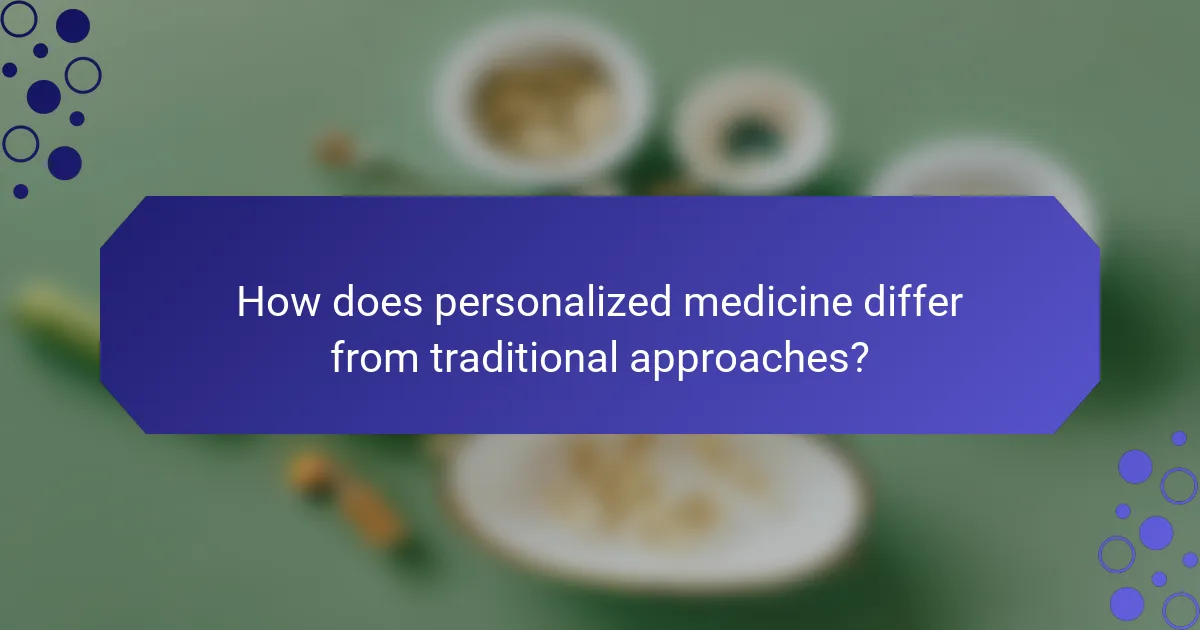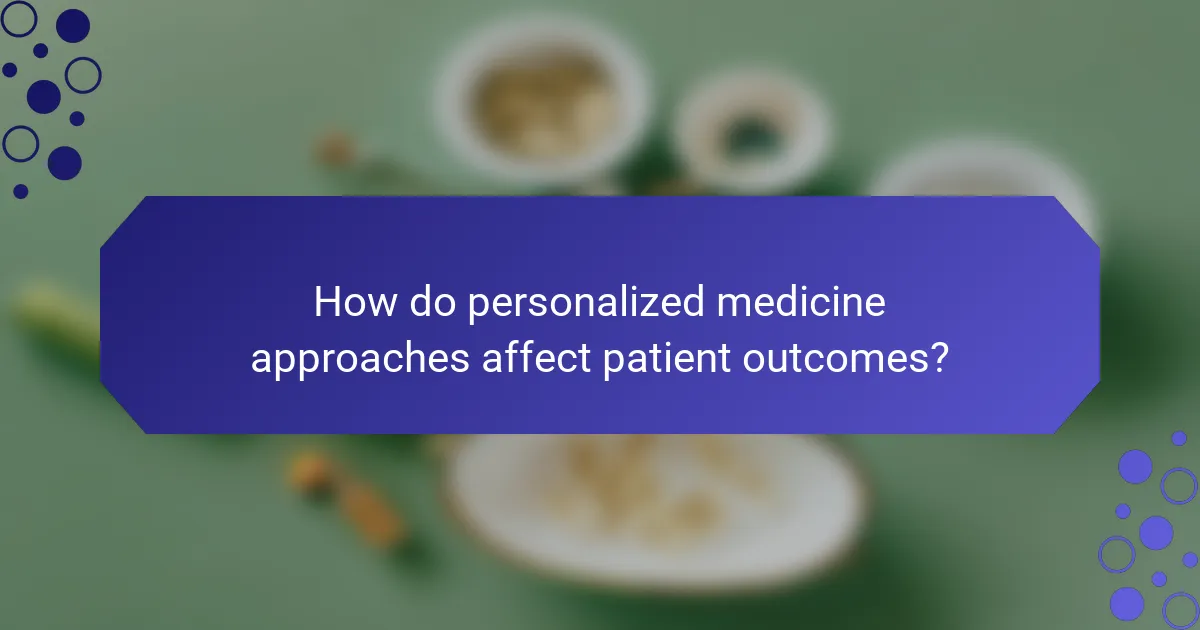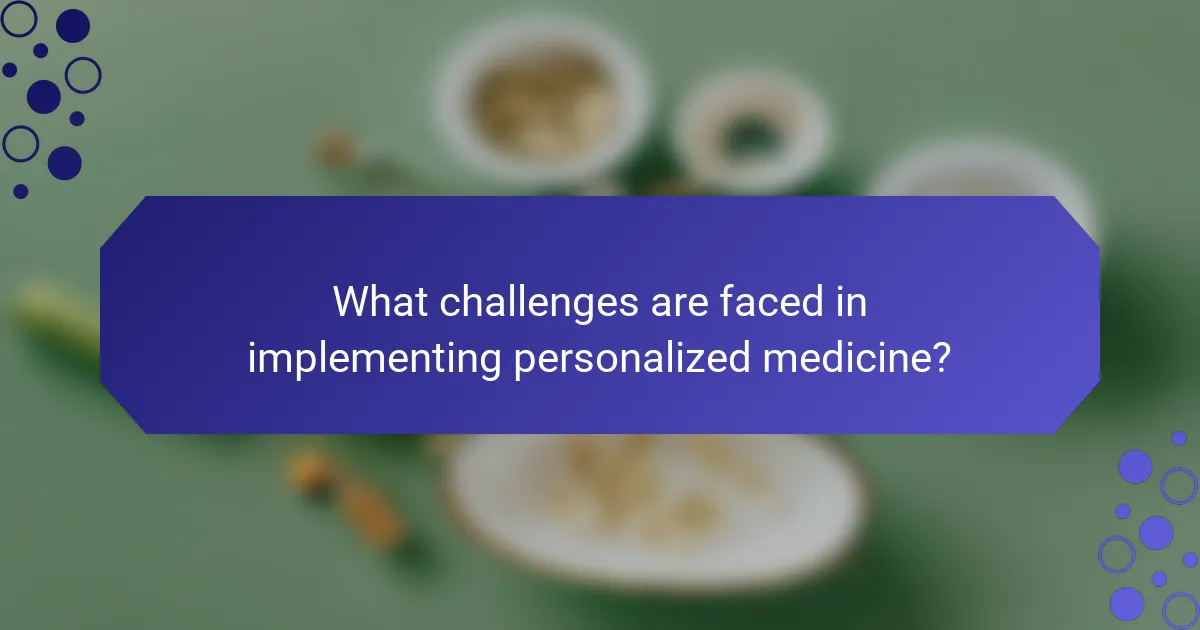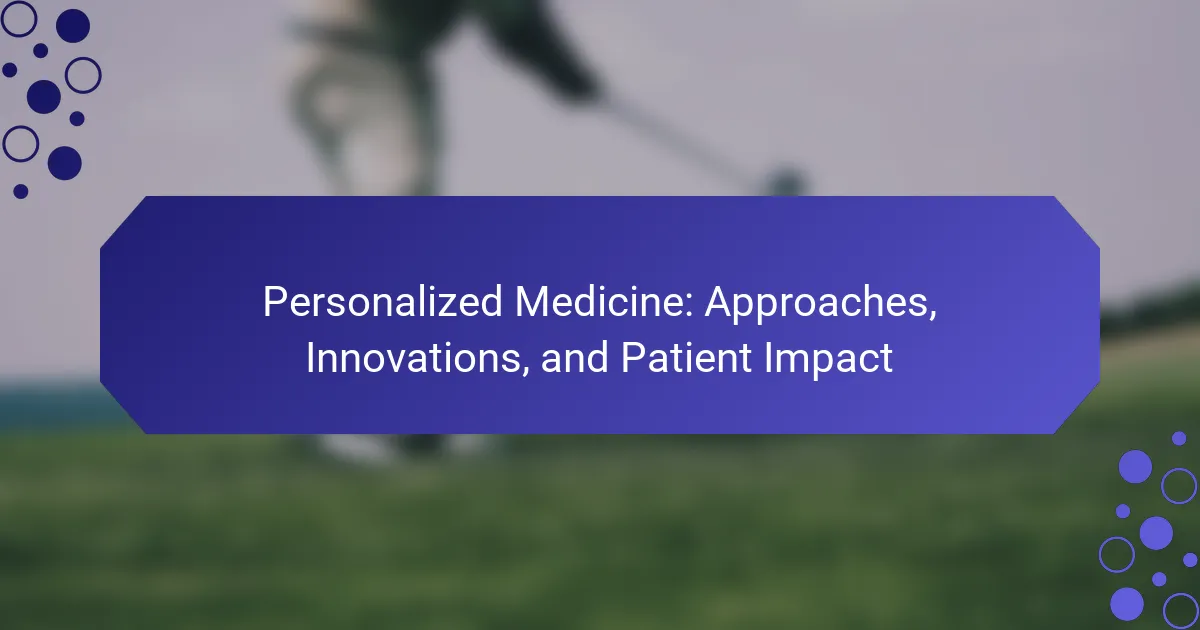Personalized medicine enhances treatment effectiveness by tailoring interventions to individual genetic, environmental, and lifestyle factors. This approach leverages advanced technologies like genomics and AI for precise therapies. Innovations in wearable health devices allow for continuous monitoring and real-time adjustments. Despite challenges in data integration and patient access, personalized medicine demonstrates significant improvements in patient outcomes across various conditions.

How does personalized medicine differ from traditional approaches?
Personalized medicine tailors treatment based on individual genetic, environmental, and lifestyle factors, unlike traditional approaches that apply a one-size-fits-all method. This innovation enhances treatment efficacy and minimizes adverse effects, leading to improved patient outcomes. Personalized medicine often utilizes advanced technologies like genomics and data analytics, allowing for more precise interventions. Traditional methods typically rely on generalized protocols, which may not account for unique patient variations.
What are the foundational principles of personalized medicine?
Personalized medicine relies on tailoring medical treatment to individual characteristics, needs, and preferences. Key principles include genomic profiling, which identifies specific genetic variations, and patient-centered care that emphasizes active patient involvement. Additionally, data integration from diverse sources enhances decision-making, while adaptive therapies adjust to patient responses over time. These foundational principles aim to improve treatment efficacy and minimize adverse effects.
Why is genomic information crucial in personalized treatment?
Genomic information is crucial in personalized treatment because it enables tailored therapies based on individual genetic profiles. This approach enhances treatment efficacy and minimizes adverse effects. By understanding genetic variations, healthcare providers can predict patient responses to medications, leading to more effective interventions. Personalized medicine leverages genomic data to optimize treatment plans, ensuring that therapies are aligned with each patient’s unique biological makeup.
How do patient demographics influence personalized medicine strategies?
Patient demographics significantly shape personalized medicine strategies by tailoring treatments to individual characteristics. Factors such as age, gender, ethnicity, and genetic background influence drug efficacy and safety. For example, older patients may require adjusted dosages due to metabolic differences. Ethnic variations can affect genetic predispositions to diseases, guiding targeted therapies. Additionally, socioeconomic status impacts access to personalized treatments, emphasizing the need for inclusive healthcare strategies. Understanding these demographics enhances the precision of personalized medicine, ensuring better patient outcomes.

What innovative technologies are shaping personalized medicine in 2025?
Innovative technologies shaping personalized medicine in 2025 include advanced genomics, artificial intelligence, and wearable health devices. These technologies enable tailored treatment plans based on individual genetic profiles and real-time health data.
Genomic sequencing allows for precise identification of genetic mutations, leading to targeted therapies. AI algorithms analyze vast datasets to predict patient responses, enhancing treatment efficacy. Wearable devices monitor health metrics continuously, providing insights that inform personalized care strategies.
As a result, these innovations improve patient outcomes and foster a more proactive approach to healthcare. The integration of these technologies signifies a shift towards individualized treatment, addressing the unique needs of each patient.
How is artificial intelligence enhancing diagnostic accuracy?
Artificial intelligence enhances diagnostic accuracy by analyzing complex medical data quickly and precisely. AI algorithms identify patterns in patient data, leading to earlier and more accurate diagnoses. For example, machine learning models can analyze imaging scans to detect anomalies that human eyes might miss. This technology reduces diagnostic errors, improving patient outcomes and personalizing treatment plans. Furthermore, AI continuously learns from new data, refining its accuracy over time, which is a unique attribute that sets it apart from traditional diagnostic methods.
What role do wearable devices play in personalized health monitoring?
Wearable devices significantly enhance personalized health monitoring by providing real-time data on individual health metrics. These devices track vital signs, activity levels, and sleep patterns, offering tailored insights for users.
The integration of wearable technology allows for continuous monitoring, which can lead to early detection of health issues. For instance, heart rate variability data can indicate stress levels, prompting timely interventions.
Moreover, wearables can facilitate personalized treatment plans by syncing with health apps, enabling healthcare providers to analyze data and adjust recommendations accordingly. This data-driven approach empowers patients to take charge of their health.
As a result, wearable devices play a crucial role in the evolution of personalized medicine, fostering a proactive health management culture.
Which advancements in biotechnology are impacting treatment options?
Advancements in biotechnology are significantly enhancing treatment options through personalized medicine. Innovations such as genomic sequencing enable tailored therapies, improving patient outcomes. For instance, targeted therapies can identify specific mutations in cancer cells, leading to more effective treatments. Additionally, CRISPR technology allows for precise gene editing, offering potential cures for genetic disorders. These approaches not only increase treatment efficacy but also reduce side effects, showcasing the transformative impact of biotechnology on healthcare.

How do personalized medicine approaches affect patient outcomes?
Personalized medicine approaches significantly enhance patient outcomes by tailoring treatments to individual genetic profiles and health conditions. This customization leads to more effective therapies, reduced side effects, and improved patient adherence. For instance, targeted therapies in oncology have shown higher response rates compared to traditional treatments. Additionally, personalized medicine can optimize drug dosages based on a patient’s metabolic response, minimizing adverse reactions. As a result, patients experience better overall health and quality of life.
What are the psychological impacts of personalized treatment on patients?
Personalized treatment positively influences patients’ psychological well-being by enhancing their sense of control and satisfaction. Tailored approaches foster a stronger doctor-patient relationship, increasing trust and adherence to treatment. As a result, patients often experience reduced anxiety and improved overall mental health. Personalized medicine addresses unique patient needs, leading to a more engaged and proactive health management experience.
How does personalized medicine improve adherence to treatment?
Personalized medicine improves adherence to treatment by tailoring therapies to individual patient characteristics. This approach increases engagement and motivation, as treatments align with patients’ unique needs and preferences. By using genetic, environmental, and lifestyle factors, healthcare providers can create more effective treatment plans. As a result, patients are more likely to follow prescribed regimens, leading to better health outcomes.
What metrics are used to assess the effectiveness of personalized therapies?
Metrics used to assess the effectiveness of personalized therapies include patient outcomes, treatment adherence, and biomarker responses. These metrics help evaluate how well therapies meet individual patient needs.
1. Patient outcomes: Measures improvements in health status, quality of life, and symptom relief.
2. Treatment adherence: Assesses how consistently patients follow prescribed therapy regimens.
3. Biomarker responses: Evaluates changes in biological markers that indicate therapy effectiveness.
4. Cost-effectiveness: Analyzes the economic impact of personalized therapies compared to standard treatments.
5. Safety profiles: Monitors adverse effects, ensuring therapies do not compromise patient safety.
6. Patient satisfaction: Gauges patients’ perceptions and experiences with personalized treatments.

What challenges are faced in implementing personalized medicine?
Implementing personalized medicine faces challenges such as data integration, regulatory hurdles, and patient access. Data integration involves combining diverse health information systems for comprehensive insights. Regulatory hurdles complicate the approval process for personalized therapies. Patient access issues arise from socioeconomic factors that limit treatment availability. Additionally, there is a need for robust clinical evidence to support personalized approaches, which can be resource-intensive to develop.
How do ethical considerations shape personalized medicine practices?
Ethical considerations significantly influence personalized medicine practices by ensuring patient autonomy and informed consent. They address issues of equity, privacy, and the potential for discrimination based on genetic information. Personalized medicine aims to tailor treatments to individual patients, but ethical frameworks guide how these innovations are implemented responsibly. For instance, ensuring that all populations have access to these advancements is crucial for equitable healthcare. Additionally, maintaining confidentiality of genetic data protects patients from misuse and reinforces trust in medical practices.
What are the barriers to access and affordability for patients?
Barriers to access and affordability for patients in personalized medicine include high costs, limited insurance coverage, and lack of awareness. These factors hinder patient access to tailored treatments and innovations. High costs often stem from advanced technologies and genetic testing. Limited insurance coverage can exclude certain personalized therapies, making them unaffordable for many. Additionally, lack of awareness among patients and healthcare providers about personalized medicine options further complicates access. Addressing these barriers is crucial for improving patient outcomes and ensuring equitable healthcare access.
How can healthcare providers overcome resistance to personalized approaches?
Healthcare providers can overcome resistance to personalized approaches by enhancing communication, demonstrating value, and fostering collaboration. Engaging patients through education about the benefits of personalized medicine builds trust. Providing clear evidence of improved outcomes can alleviate skepticism. Collaborative care models that involve multidisciplinary teams promote a holistic approach, addressing diverse patient needs.

Which unique case studies highlight the success of personalized medicine?
Multiple case studies demonstrate the success of personalized medicine across various conditions. One notable example is the use of targeted therapies in breast cancer treatment, where genetic profiling identifies specific mutations, allowing for tailored drug regimens. Another case involves cystic fibrosis, where treatments like CFTR modulators are customized based on individual genetic variations, improving patient outcomes. Additionally, in oncology, immunotherapy has shown remarkable success by personalizing treatment based on tumor genetics, leading to higher response rates. These cases highlight the transformative impact of personalized medicine in enhancing treatment efficacy and patient quality of life.
What lessons can be learned from specific patient success stories?
Patient success stories in personalized medicine highlight the importance of tailored treatments. These narratives demonstrate improved outcomes through individualized therapies, showcasing how specific genetic profiles lead to effective interventions. For instance, patients with unique biomarkers have experienced significant symptom relief and enhanced quality of life. Such cases emphasize the potential for personalized approaches to transform healthcare, encouraging further innovation in treatment strategies.
How do cultural attitudes influence the acceptance of personalized therapies?
Cultural attitudes significantly influence the acceptance of personalized therapies. Societal beliefs about medicine and health shape patient expectations and willingness to adopt new treatments.
In cultures that prioritize traditional healing practices, there may be skepticism towards personalized medicine, viewed as too complex or unproven. Conversely, societies that embrace innovation and technology tend to show greater openness to personalized therapies.
Education plays a crucial role in shaping these attitudes. Increased awareness of the benefits and potential of personalized medicine can enhance acceptance.
Trust in healthcare providers also impacts acceptance. Patients who have confidence in their doctors are more likely to embrace personalized treatment plans.

What future trends are expected in personalized medicine?
Future trends in personalized medicine include advancements in genomics, artificial intelligence, and patient-centric approaches. These innovations aim to enhance treatment efficacy and tailor therapies to individual genetic profiles. Increased integration of data analytics will allow for more precise predictions of treatment outcomes. Additionally, the rise of wearable technology will facilitate continuous health monitoring, enabling real-time adjustments to personalized treatment plans.
How will regulatory frameworks evolve to support personalized approaches?
Regulatory frameworks will increasingly adapt to support personalized medicine through flexible guidelines and data-sharing policies. These frameworks will prioritize patient safety while enabling innovations in treatment. For instance, adaptive trial designs will facilitate quicker approvals for personalized therapies. Additionally, regulations will evolve to address privacy concerns related to genetic data, ensuring that patient information is protected while promoting research. As a result, a balance between innovation and ethical standards will enhance patient outcomes in personalized medicine.
What potential breakthroughs are on the horizon for genetic therapies?
Personalized medicine is poised for breakthroughs in genetic therapies that enhance treatment efficacy. Innovations include CRISPR advancements, which allow precise gene editing, and mRNA technology, which enables targeted therapies. These approaches promise to tailor treatments to individual genetic profiles, improving patient outcomes significantly. As a result, therapies could become more effective and have fewer side effects, addressing the unique needs of diverse populations.
How can patients advocate for personalized treatment options?
Patients can advocate for personalized treatment options by actively engaging in their healthcare decisions. They should research their conditions, understand available treatments, and communicate openly with healthcare providers. Building a strong patient-provider relationship fosters collaboration and ensures treatments align with individual needs.
Additionally, patients can join support groups to share experiences and gather insights on personalized approaches. They should inquire about genetic testing and other diagnostic tools that can inform tailored therapies. Engaging with advocacy organizations can also amplify their voices in promoting personalized medicine initiatives.
What best practices should patients follow when considering personalized medicine?
Patients should prioritize informed decision-making and open communication when considering personalized medicine. Understanding genetic factors, treatment options, and potential outcomes is crucial.
1. Consult with healthcare professionals specializing in personalized medicine to assess individual needs.
2. Request genetic testing to identify specific biomarkers that may influence treatment choices.
3. Stay informed about the latest research and innovations in personalized medicine.
4. Engage in discussions about treatment goals and preferences with healthcare providers.
5. Consider the potential risks and benefits of personalized treatment options.
6. Maintain a proactive approach by asking questions and clarifying uncertainties throughout the process.
